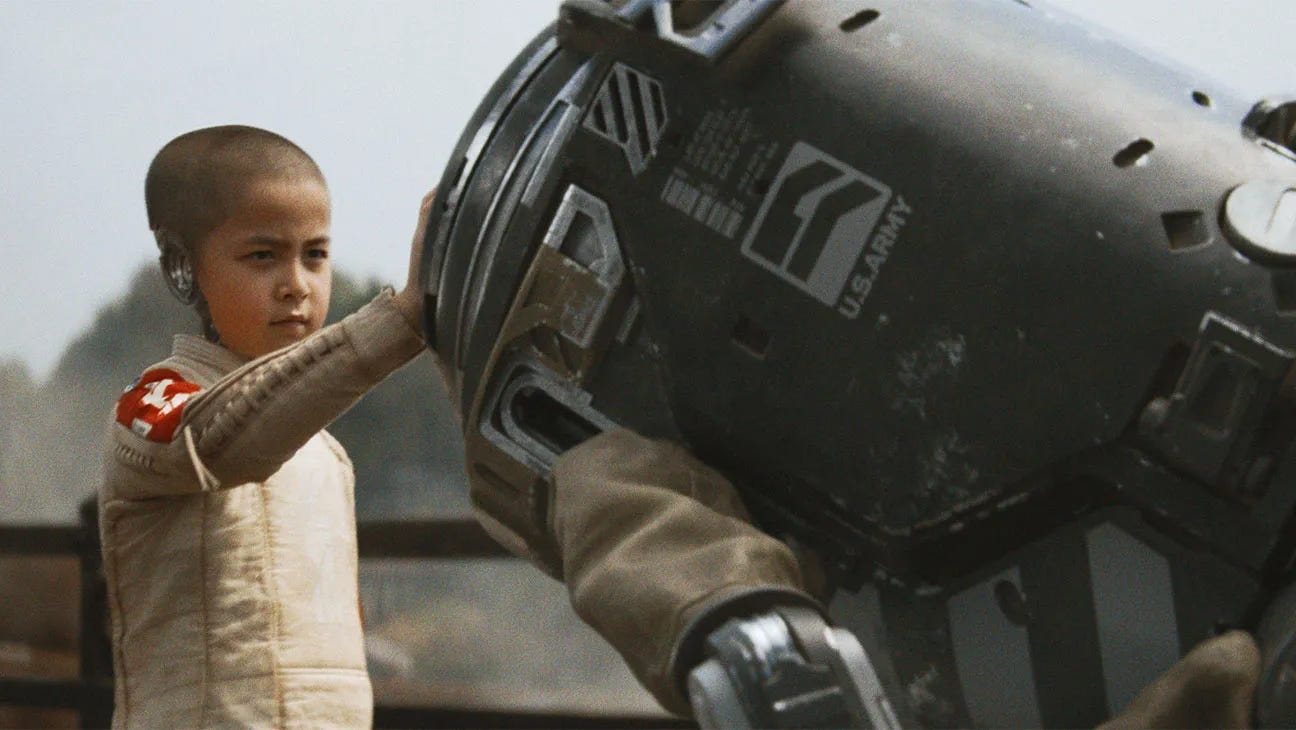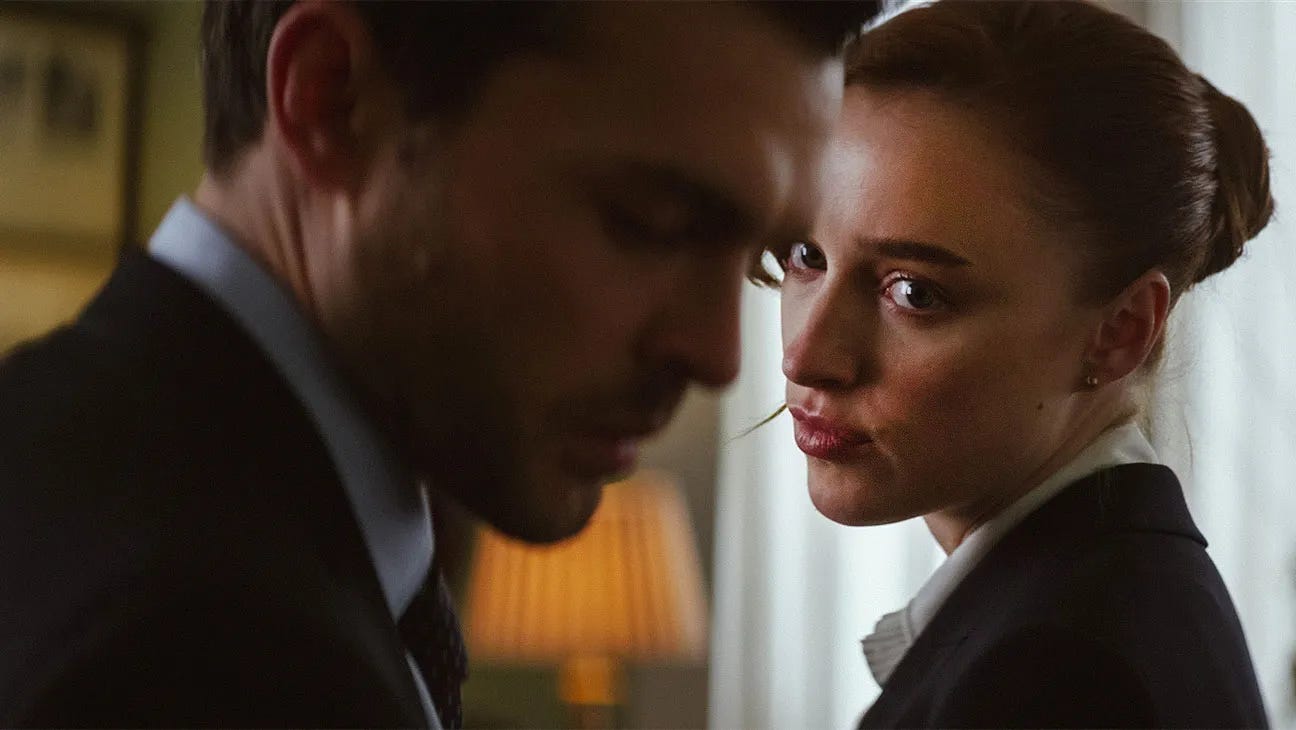In Review: 'The Creator,' 'Fair Play'
AI clashes with humanity in a futuristic sci-fi action film while a different sort of conflict powers an intense drama about workplace romance under pressure.
The Creator
Dir. Gareth Edwards
133 min.
Roger Ebert famously said that “It’s not what a movie is about, it’s how it is about it.” That sentiment holds 99% of the time, deferring as it does to the artistry that animates (or sometimes foils) whatever a movie is trying to pull off. But then you encounter a case like The Creator, a handsome and original studio science fiction film, and wonder what, exactly, it’s seeking to express. It takes place in a future that’s currently breathing down our necks, as A.I. has become so sophisticated and powerful that it’s grown apart from its human engineers. And yet, what the film has to say about this threat is unclear, which should not be confused for friendlier adjectives like “nuanced” or “ambiguous.” It’s genuinely hard to understand what director Gareth Edwards, who co-wrote the script with Chris Weitz, is trying to say, even as he says it with impeccable craft.
Working from a grab-bag of big-budget influences—Terminator 2: Judgment Day, A.I. Artificial Intelligence, Blade Runner, and Aliens all appear to be touchstones—Edwards (Godzilla, Rogue One) descends elegantly into a future war, with Radiohead’s “Everything In Its Right Place” thrumming ironically on the soundtrack. The human race is at war with artificial intelligence, but the battle lines are more East versus West than man vs. machine, with the United States leading the charge against A.I. while East Asian countries (now called “New Asia”) have found a way for all entities to leave peaceably side by side. The U.S. has a good reason to hold a grudge, as the bots once invented to make life easier wound up flattening Los Angeles in a nuclear blast.
Enter Joshua (John David Washington), an ex-undercover soldier who’s living in New Asia with his pregnant wife Maya (Gemma Chan) and whose war-mangled body, outfitted with high-tech prosthetics, suggests the possible harmony of human/machine integration. But for now, his inside information is considered valuable to the human cause. There’s a top-secret weapon in development that could spell doom for humanity and a tough-talking colonel (Allison Janney, in Sigourney Weaver mode) recruits Joshua on a mission to infiltrate an underground facility. Once inside, though, Joshua learns that the weapon is a six-year-old girl (Madeleine Yuna Voyles), so he opts to name her “Alphie” and protect her from harm.
Edwards is a technically skilled director—the last third of Godzilla is about as satisfying a stretch as studio blockbusters have had in recent history—and the hunt for Joshua and Alphie as they’re on the lam leads to some breathtaking moments, evoking the Vietnam War but with a landscape that’s haunted by futuristic weaponry and a kind of drone that looks like an alien mothership. The degree to which man and machine have merged also leads to visually compelling “simulants,” like one played by Ken Watanabe, whose allegiances are firmly in the A.I. camp, but whose expressions suggest a world where such distinctions may not matter. At the same time, Alphie’s kid-like interest in watching TV—she’s introduced curled up like a typical kindergartener zoning out in front of cartoons—masks her sophistication and her motives. If she’s a simulant, too, maybe she’s manipulating Joshua (and us) by playing the sweet, precocious imp.
With the A.I. issue becoming a sticking point the writers strike that just concluded—and the actors strike that continues—it’s odd for The Creator to have such a murky perspective. Edwards proves himself to be an outstanding world-builder—every dime of that $80 million budget is on the screen and then some—but when all the drama gets sorted out, it’s hard to fathom what he actually wanted to say about his imagined future, other than maybe a plea to accept the mystery a little. The Creator has the look and feel of a major science fiction epic, with all of the swing-for-the-fences bravado of the films that it’s so studiously and prodigiously aping. But of all the questions left to ponder in the end, the one that lingers the most shouldn’t be, “What exactly was the point of all that?” — Scott Tobias
The Creator opens this weekend in theaters everywhere.
Fair Play
Dir. Chloe Domont
115 min.
Staring at his fiancée Emily (Phoebe Dynevor) as they share a shower and a celebratory bottle of champagne, Luke (Alden Ehrenreich) has only one question on his mind: “How did I get so fucking lucky?” He has good reason to ask. Luke shares a passionate and deeply comfortable relationship with Emily, as evidenced by the funny/gross pre-proposal sex scene that opens the film. And now he’s gotten word that he’s up for a big promotion at One Crest Capital, the investment house where they both work. What could go wrong?
A better question: What’s wrong already? Luke and Emily both wake up before dawn before taking separate routes to work, where nobody knows they’re a couple. Every day at the office is a white-knuckle thrill ride in which one mistake might earn the disapproval of their unforgiving boss Campbell (Eddie Marsan, terrifying) and undo their careers—and maybe their sanity: The position Luke’s eyeing is only available because of a co-worker’s mid-day meltdown. But Luke wants it anyway—more, if he’s being honest with himself, than he wants anything else. So when he learns Emily is the one getting bumped up, he appears gracious, even proud, and says and does all the right things and quietly starts to crack.
Writer-director Chloe Domont’s feature debut, Fair Play depicts the many side effects of breathing a toxic atmosphere for too long. Unable to deal with his disappointment and Emily’s success, Luke’s male fragility—that position belonged to him and not a woman, even his woman—and steady disintegration transforms him into a villain, but his malevolence doesn’t develop in isolation. While Fair Play never lets Luke off the hook as his passive aggression turns into outright aggression and worse, it treats Emily’s own behavior as a catalyzing agent. She decides the only way to succeed in a boys’ club is to act like one of the boys. Whatever made Luke fall for her, it wasn’t a tendency to show up drunk in the middle of the night after a late night at a strip club and giggling as she repeats her coworkers’ misogynistic tales of sexual misadventure. That much pressure and money has a warping effect. It makes everybody ugly.
Domont brings a cool, distant approach to the direction, letting Ehrenreich and Dynevor supply the heat as the divide between them deepens. They play off each other well, both in early scenes as two characters who seem very much in love and in later moments when Luke’s lashing out prompts Emily to say whatever she has to say just to survive, professionally and otherwise. That’s what anyone who wants to stick around the world she’s chosen has to do. Luck’s an illusion. —Keith Phipps
Fair Play opens in select theaters tonight. It will debut on Netflix on October 6th.









I read the plot description of The Creator twice and I still don't quite understand what's going on...! No wonder the movie is lacking a purpose. "Computers becoming sentient and destroying people" has been a dystopian scifi concept for what seems like forever. I guess with the rise of ChatGPT/LLM, that future seems as close as ever, but I don't know. I'm still more worried about us humans destroying ourselves before any machine even gets a chance to do it...
I think The Creator is going to be one that audiences go back to and re-evaluate over time. I’m not sure what it’s trying to ‘say’, but, then again, I didn’t know what Blade Runner was trying to say, first time around - and that was on the weekend of its release in the UK, on the big screen. First impressions? I loved The Creator, was both excited and moved by it. Which is not a response I’ve had to any other blockbuster in recent years. As for its deeper, meaning, or otherwise? Time will tell.